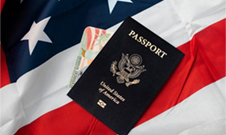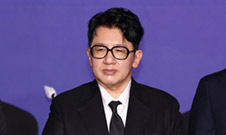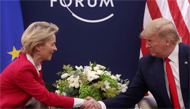- ‘영어=공식언어’ 행정명령에…국세청, 다국어 지원 폐지 검토
- “영주권자도 신분 서류 지참해야”
- [사고] 제16회 한국일보 칼리지 엑스포… 최고의 명문대 합격 노하우
- 한인타운 한복판서 무장괴한 대치 소동
- [화제] 7월7일의 기적… 네 자녀 같은 생일
- 한국인 전용 취업비자 법안 재발의
close
- “통화 대혼란(이창용 한국은행 총재)”“설계자 기회(김용범 정책실장)”… 누가 맞든 가야 할 스테이블코인
- FCC, 스카이댄스의 약 80억 달러 규모 파라마운트 인수 승인
- “8월 1일 관세 강행” 트럼프 위협 불구 시장 평온한 이유는
- ‘트럼프 이민단속’… 가주경제 피해 전국 1위
- “관세 회피하면 민사·형사처벌까지 각오해야”
- MS 해킹 피해, 예상보다 심각
close
- 오타니 5경기 연속 홈런
- EPL 뉴캐슬, 윙어 박승수 영입
- [전익환 프로의 골프교실] 퍼팅의 셋업
- 홍명보호, 포르투갈 코치 2명 새로 영입
- 김세영, LPGA 스코틀랜드 오픈 1R 공동 7위…1위와 두 타 차
- 김혜성, 2타점 적시타에 시즌 12호 도루
close
- 슬기로운시니어생활 33회
- 법대 출신 고시생→생계형 셰프의 ‘전라도 프렌치’
- ‘남자라는 이유로’ 조항조, 라디오서울 개국 33주년 단독 콘서트 개최
- [장준우가 만난 셰프들] 국수야? 파스타야? 이탈리안 셰프가 만드는 한국 전통 ‘난면’
- 슬기로운시니어생활 32회
- [장준우가 만난 셰프들] “진짜 한식은 지방에 있다”… 마산 ‘당일바리’ 사오는 사장
close
- 자녀 대학 입시에서 부모의 역할은?… ‘과유불급’
- ‘링크드인’ 입시에 유용… 온라인 스토리 보여줄 기회
- UC 시스템의 학기제 전환 논의
- 명문대 입시에서 ‘아시아계다움’을 벗어나는 법
- 값을 매길 수 없는 것
- 입학사정과 재정보조준비의 상관관계
close
- 쉰넘어 빠진 이 방치? 암 발생 최대 18% 뛴다
- 신물이 올라오고 목에 뭔가 걸린 것 같다면… “야식부터 끊으세요”
- 허리둘레 또 늘었다? 심장·뇌 건강에 ‘비상등’
- [진료실 밖 건강상식] 덥다고 운동 패스?… 고령층 근육 줄고 관절 굳어 건강에 더 안 좋아
- 툭하면 체하고 더부룩… ‘췌장암’ 의심되는 SOS 신호
- 비타민D 부족하면 치매? 여성 ‘이 유전자’ 없을 때만 해당된다
close
- 가을빛 삿포로에서 만난 단풍·온천·미식
- [ 주말 뭐 볼까 OTT] “헛소리는 그만” 거짓말 탐지기 찰리 게일의 살인사건 해결기
- 대학 친구들이 30년 만에 만났는데… 크루즈 여행 중 벌어진 일
- 직경 20m 소용돌이, 6.5톤 넝쿨다리… 새로운 일본을 만나다
- [새 영화] ‘로맨스 영화로 자아발견과 자신의 성적 기호에 대한 수용’
- 나치 점령 하에 프랑스 시민들의 동조와 저항 그린 명작
close
- 내집 장만 위해 ‘보복 저축’… ‘MZ 챌린지’ 인기
- “보험료 오를라”… 주택소유주 25% 보험 청구 포기
- “집중하자!! 최고의학군, 살기좋은 OC 지역”
- ‘베스팅(Vesting)’ 선택, 절세와 상속의 갈림길
- “집 볼 때 잠시 나가주세요”… ‘졸졸’ 셀러에 불편
- 올 주택 보험료 또 오른다… 2025년 평균 3,520달러
close
- “나 잊지 말아줘”..차은우, 軍 입대 전 헛헛한 심경 고백
- “검거 안됐으면 죽었을 것”..돈스파이크, 마약 예방 전도사 됐다
- 방탄소년단 진, 카우보이도 홀렸다♥..댈러스 아메리칸 에어라인스 센터 최다 판매 쇼·亞솔로 최초 매진 기록
- “돌아갈수도” 뉴진스vs어도어 전격 합의? 8월 14일 비공개 조정
- 신정환, ‘상습 도박’ S.E.S. 슈 저격+욕설 “X같아..지가 뭔데 법을 따져”
- 김혜수, 남사친과 얼굴 맞대고 각선미 자랑.. “with OJ♥”
close
Is the President above the law? The Supreme Court thinks so

by Isaac Kim (PVPHS / 10th Grade)
The Supreme Court is poised to rule against democracy.
On April 26, the Roberts Court heard arguments on Donald Trump’s claim that he is legally immune from prosecution after leaving office. Most people expected to see the Court, which currently has a conservative majority in the docket, to decisively rule against his claim that former presidents are immune to criminal prosecution.
Instead, America has been surprised with what appears to be the total opposite: not only is the Court treating the question of “should the law apply to everyone?” as if it is a fiendishly difficult problem, but it is poised to rule in favor of Trump, conceding to the legally dubious claim that the president cannot be criminally prosecuted after he leaves office. (This is a distinction from civil lawsuits arising from non-official acts and which presidents enjoy at least some immunity from.)
The arguments made before the court by D. John Sauer, Donald Trump’s lawyer, are dubious claims at best and mind-bending feats of logic at worst. According to Mr. Sauer, a president ought to be immune from prosecution for actions such as selling nuclear secrets, employing the military to assassinate political rivals, and launching coups. That last part is especially worrying - Trump v. United States mainly hinges on this issue, where many observers have described the former president’s actions in 2021 as attempting or inciting insurrection against the government - and it is especially worrying that Mr. Sauer brazenly doubled down on actions such as these. When Justice Sonya Sotomayor, for instance, brought up the issue of assassinating political rivals, Mr. Sauer responded by saying, “That could well be an official act” (Trump v. United States 9).
Equally worrying is the ease with which certain conservative justices of the Court agreed with such feats of logic. Justice Samuel Alito notably seems to agree, arguing that “A stable democratic society requires that a candidate who loses an election, even a close one, even a hotly contested one, leave office peacefully… will [presidential prosecution] not lead us into a cycle that destabilizes the functioning of our country as a democracy?” (Trump v. United States 111).
Justice Alito has it backward: even ignoring the underlying irony of Trump asserting that the president is free from criminal prosecution while simultaneously threatening such prosecution against his opponents, the argument that presidents cannot act properly under the threat of such prosecution defies both logic and the law.
After all, as Michael Silk writes in The New York Times, “there is perhaps no greater deterrent to a president who has lost an election refusing to leave peacefully than… criminal prosecution” (Silk 24). If the president was immune from actions undertaken when he was in office, does that, legally speaking, excuse the internment camps of WWII under FDR, or the Watergate scandals under Nixon? And, if the president alone is immune for his actions, what does that say about the Court’s motto, inscribed in the pediment of its building: “Equal Justice Under Law”?
Especially startling was, as Professor Michael Dorf puts it, “the apparent lack of self-awareness on the part of some of the conservative justices” (Liptak 24). It is bitterly ironic that conservative justices of the Court fret over nebulous hypothetical presidents of the future holding on to power by escaping legal prosecution while allowing a former president to hold on to power by escaping legal prosecution, at the same time. Indeed, there seems to be a relentless attempt by conservative justices to blatantly ignore the facts of the case at hand; “I’m not discussing the particular facts of this case,” Justice Alito declared (Trump v. United States 99).
“What struck me most… was the relentless efforts by several of the justices on the conservative side not to focus on, consider or even acknowledge the facts of the actual case in front of them,” writes Professor Pamela Karlan (Liptak 24). No question about it now: the conservatives of the Roberts Court are siding with Trump, and they are doing so by ignoring Trump’s actual actions in favor of deciding in the realm of legalese, spinning the issue of presidential immunity as if it is a Gordian Knot, a question dictated by “what if”s and “unless”s. Context-dependent, as Mr. Sauer argues. It is not. The law applies to everyone: that’s what the point of the law is, that no one, not even the most powerful man on Earth, is above the law.
But this is not the case for the conservative majority of the Court, who, in the words of Ian Millhiser, “completely ignored the risk that an un-prosecutable president might behave like a tyrant” while simultaneously defending such immunity (Millhiser 24). Ruling in favor of Trump - a decision that the Court is poised to uphold, seeming “ready to offer some protections from criminal prosecution” (Beitsch & Schonfeld 24).
The implications of such a ruling go without saying. Should the Court rule in favor of Trump, agreeing that presidents are absolutely immune from actions taken in office, it would imply that presidents are allowed to get away with virtually anything while exercising executive authority. Under Mr. Sauer’s interpretation, that means anything from attempting a coup with military force to assassinating political rivals, from selling national security secrets to foreign powers to theft, embezzlement, and a thousand other potential crimes. “The entire corpus of federal criminal law,” said Michael Dreeben, a counselor for the prosecution, “would all be off limits if it were taken to the total to the extent that some of the questions have suggested” (Beitsch & Schonfeld 24).
Within the nebulous plane of legal hypotheticals and quandaries, such dizzying defiances of logic might justify the preposterous claim that a president is excused from any crime at all as long as Congress doesn’t find out about it. But in the real world, one where certain people have brazenly attempted to steal elections and cynically hold on to executive power, “it’s really hard to imagine a ‘stable democratic society’... where someone who did what Donald Trump is alleged to have done leading up to Jan. 6 faces no criminal consequences for his acts” (Liptak 24). Legal parameters exist for a reason: they help keep a democratic, stable, and free society upright. And these parameters, especially those limiting the executive, are crumbling.
Justice Ketanji Brown Jackson is right when she says that “we would have a really significant opposite problem if … someone with those kinds of powers… could go into office knowing that there would be no potential penalty for committing crimes” (Trump v. United States 62). Because if the highest Court of the land agrees that presidents are not guilty of crimes if the rest of the government doesn’t find out about them, if it says that presidents are immune from any criminal prosecution for a myriad of federal crimes (all of them, in fact), if it says that the president is free to stand above the law…
What makes a president different from a king?
스마터리빙
more [ 건강]
[ 건강]이제 혈관 건강도 챙기자!
[현대해운]우리 눈에 보이지 않기 때문에 혈관 건강을 챙기는 것은 결코 쉽지 않은데요. 여러분은 혈관 건강을 유지하기 위해 어떤 노력을 하시나요?
 [ 건강]
[ 건강]내 몸이 건강해지는 과일궁합
 [ 라이프]
[ 라이프]벌레야 물럿거라! 천연 해충제 만들기
 [ 건강]
[ 건강]혈압 낮추는데 좋은 식품
[현대해운]혈관 건강은 주로 노화가 진행되면서 지켜야 할 문제라고 인식되어 왔습니다. 최근 생활 패턴과 식생활의 변화로 혈관의 노화 진행이 빨라지고
로컬뉴스
more
“민주와 자유위한 헌신에 감사해요”
월남전 참전 한인들의 모임인 ‘월남전참전자회 미 남서부 지회’(회장 김기태) 회원 39명이 민주와 자유 수호를 위한 헌신에 감사하는 감사장을 …

‘IM 선교회’ 한미시니어 센터 방문
한국과 텍사스에 본부를 두고 있는 ‘IM 선교회’(대표 마이클 조 선교사)는 지난 16일 가든그로브 한인타운에 있는 OC한미시니어 센터(회장 …
‘김용학 박사 초청 천문학 강의’
‘번민하는 이웃과 함께’라는 모토로 활동하고 있는 OC 한인 커뮤니티 대표적인 비 영리 기관 중의 하나인 ‘한미가정상담소’(이사장 수잔 최)는…
어바인 ‘내셔널 나잇 아웃’ 내달 5일 그레이트 …
어바인 경찰국은 ‘내셔널 나잇 아웃’ 행사를 내달 5일(화) 5시 30분부터 7시 30분 그레이트 팍(8000 Great Park Blvd) …
GG 게리 홀 수영장 보수 공사로 임시 폐쇄
가든그로브 시는 지난 24일부터 이스트게이트 공원에 있는 게리 홀 수영장을 응급 보수 관계로 폐쇄한다고 밝혔다. 이 수영장은 오는 29일 재 …
사람·사람들
more많이 본 기사
- “영주권자도 신분 서류 지참해야” 4
- “테슬라, 캘리포니아서 무인택시 영업 허가 아직 못 받아”
- “물놀이 갔다가 18일 만에 사망”… 어린이 덮친 ‘뇌 먹는 아메바’의 공포
- 이주노동자 지게차 화물 결박…경찰, 한국인 동료 입건
- 트럼프 장남 투자사, 한국시장 상륙한다[시그널]
- 내란특검, ‘언론사 단전·단수’ 이상민 전 장관 19시간 소환조사
- 백악관 “불공정 무역장벽 낮추기 위해 韓과 생산적인 협상 계속”
- 트럼프 “파월, 금리인하 권고할 것…弱달러가 美에 돈 벌어줘”
- 멕시코, ‘美 이민자 지원’ 복권 발… 1
- “7년 거주하면 영주권 신청 자격 부여” 법안 의회 상정
- 시민권 시험 어려워진다… ‘전문직 비자’ 발급도 까다롭게
- 김세영, 이틀 연속 이글…LPGA 스코틀랜드 오픈 2R 4위 점프
- 소화기 내과전문의가 권하는 변비 특효약 “키위 2개”
- 연방국세청, 다국어 지원 폐지 검토
- 하루 7천보만 걸어도 효과 조기사망 위험 47%까지 ↓
- 테슬라 “‘xAI에 투자’ 주주제안 다수 접수”…11월 주총서 투표
- 뉴욕시 피난처 도시 정책 흔들리나
- 美의 브라질 50%관세는 전략광물 통제용?…룰라 “건드리지 마”
- 美 “트럼프, 北 완전비핵화 위한 김정은과의 소통에 열려 있어”
- “영주권 카드 소지하지 않으면 벌금·징역형”
- 트럼프 직무수행 긍정평가 37%
- “매년 촛불 밝혀 기억하겠다”
- “대북정책 실패…새 협상 나서야”
- LVMH, 명품 브랜드 ‘마크 제이콥스’ 매각 논의
- 구글 검색의 진화…복잡한 질문 주제별로 정리해준다
- 센터빌 대형 그로서리서 성추행 사건 발생
- 워싱턴 ‘마구잡이식’불체자 체포 늘어
- 뉴욕증시, 美·EU 정상 회동에 무역합의 기대…강세 마감
- [사고] 제16회 한국일보 칼리지 엑스포… 최고의 명문대 합격 노하우
- 신화 이민우, 깜짝 결혼 발표.. ‘살림남’서 최초 공개
- “나흘간 12시간씩 연속노동 가능합니… 1
- 특검, 압수수색날 ‘문고리’ 소환… ‘김건희 목걸이’ 추정품 확보
- 끔찍한 도끼 살인… 가장이 가족 공격 후 자살 ‘충격’
- “오픈AI, 차세대 AI 모델 GPT-5 이르면 내달 출시”
- 뉴멕시코주 대학 기숙사서 총격…1명 사망, 1명 부상
- “한인 경제 회복 위해 총력”
- 尹정부 앞줄 차장들·특수통 빠져… ‘인사태풍’ 李정부 검찰인사
- MD 거주 김혜숙 씨, 홀인원
- ‘트럼프 이민단속’… 가주경제 피해 전국 1위
- “민주와 자유위한 헌신에 감사해요”
- 불체자에 복지혜택 제한 정책 일시 중단 판결
- ‘아기상어’ 표절 소송 6년만 결론..8월 14일 대법원 선고
- 월가 전문가 “금리인하·규제완화로 주… 1
- 미국발 한국행 마약밀수 대량 적발
- “광복의 함성과 정신을 예술로”
- [살며, 느끼며] 국수가 먹고싶다
- 트럼프 정부-컬럼비아대 ‘벌금 합의’, 다른 대학 협상 롤모델로
- 트럼프, 가자휴전협상교착에 “하마스, 타결보다 죽고싶어하는듯”
- 해병특검, ‘이종섭 최측근’ 박진희 … 1
- 태국-캄보디아, 이틀째 포격 등 전투…양국 사망자 16명
1/5지식톡

-
 한국 화장품 오프라인 구매 어디서 …
0
한국 화장품 오프라인 구매 어디서 …
0여드름피부라 더랩바이블랑두 스킨을 오래 사용했는데 재구매하려고 보니 미국내에서 아마존과 코슷코 온라인에서만 구매 가능하더라구요. 혹시 더랩바이블랑두 토너 오프라인 구매처는 따로 없을까요?가격은 코슷코 기준 큰거 두…
-
 한국 화장품 오프라인 구매 어디서 …
0
한국 화장품 오프라인 구매 어디서 …
0여드름피부라 더랩바이블랑두 스킨을 오래 사용했는데 재구매하려고 보니 미국내에서 아마존과 코슷코 온라인에서만 구매 가능하더라구요. 혹시 더랩바이블랑두 토너 오프라인 구매처는 따로 없을까요?가격은 코슷코 기준 큰거 두…
-
 [AP/IB 내신] 에듀스팟 GPA…
0
[AP/IB 내신] 에듀스팟 GPA…
0웹사이트 : www.eduspot.co.kr 카카오톡 상담하기 : https://pf.kakao.com/_BEQWxb블로그 : https://blog.naver.com/eduspotmain안녕하세요. 서울 압구정에…
-
 찬양팀 & 선교팀
0
찬양팀 & 선교팀
0남가주 멕시코 선교팀 & 찬양팀 에서 도네이션 받습니다 모든 악기 종류,악세사리, 앰프,스피커, 마이크,통기타, 전기기타, 자전거, 스쿠터,모터싸이클,드럼,키보드, 색소폰, 트럼펫, 트롬본, 베이스기타,방송 장비들…
-
 오이지 만드는 법
0
오이지 만드는 법
0안녕하세요, 보통 페르시안 오이는 쉽게 물러서 오이지를 담지 않는데요, 혹시 오이지를 만드시는 분이 계실까요? 지식나눔을 해 주신다면 감사 하겠습니다. ((꾸벅))
케이타운 1번가
오피니언
 민병임 뉴욕지사 논설위원
민병임 뉴욕지사 논설위원[살며, 느끼며] 국수가 먹고싶다

연방기관 다국어 서비스 중단 안 된다

트럼프의 의료·복지혜택 삭감 저지해야
 김미선 서북미문인협회 회장ㆍ시인
김미선 서북미문인협회 회장ㆍ시인 [한국춘추] 지금은 우리의 산야를 다시 그릴 시간
 이희숙 시인ㆍ수필가
이희숙 시인ㆍ수필가 [금요단상] 미국 이민과 역이민
 신상철 / 고려대 고고미술사학과 교수
신상철 / 고려대 고고미술사학과 교수 [미술 다시보기] 샤갈의 ‘이카로스의 추락’
 김현수 / 서울경제 논설위원
김현수 / 서울경제 논설위원스트래티지
 한 영 재미수필문학가협회 회장
한 영 재미수필문학가협회 회장 [한영의 독서칼럼] 우리에겐 새 이름이 필요해
 윤민혁 서울경제 실리콘밸리특파원
윤민혁 서울경제 실리콘밸리특파원 [실리콘밸리 View] 오픈AI·소뱅의 ‘5천억 달러’ 스타게이트
1/3지사별 뉴스

뉴욕시 피난처 도시 정책 흔들리나
아담스시장·시의회·뉴욕시경 등 피고 뉴욕시, 연방정부 협력 재검토 할 듯도널드 트럼프 행정부가 이민법 집행 노력을 방해한다는 이유로 뉴욕시를…
트럼프 직무수행 긍정평가 37%

워싱턴 ‘마구잡이식’불체자 체포 늘어
최근 미 전국에서 대대적인 불체자 체포 및 추방 작전이 이어지고 있는 가운데 최근 워싱턴 일원에서 전과 기록이 없는 불법체류자들이 대거 붙잡히…
주민들“우리는 외면당했다”

떨고있는 한인 업계… 직원 이어 고용주도 ‘정조준’
도널드 트럼프 2기 행정부가 불법이민을 적발하기 위해 고용 서류 점검을 확대하면서 한인 고용주들의 발등에 불이 떨어졌다. 코로나19 팬데믹 이…
산호세한인침례교회, 장한중 목사부임

오늘 하루 이 창 열지 않음 닫기 




















































.png)


댓글 안에 당신의 성숙함도 담아 주세요.
'오늘의 한마디'는 기사에 대하여 자신의 생각을 말하고 남의 생각을 들으며 서로 다양한 의견을 나누는 공간입니다. 그러나 간혹 불건전한 내용을 올리시는 분들이 계셔서 건전한 인터넷문화 정착을 위해 아래와 같은 운영원칙을 적용합니다.
자체 모니터링을 통해 아래에 해당하는 내용이 포함된 댓글이 발견되면 예고없이 삭제 조치를 하겠습니다.
불건전한 댓글을 올리거나, 이름에 비속어 및 상대방의 불쾌감을 주는 단어를 사용, 유명인 또는 특정 일반인을 사칭하는 경우 이용에 대한 차단 제재를 받을 수 있습니다. 차단될 경우, 일주일간 댓글을 달수 없게 됩니다.
명예훼손, 개인정보 유출, 욕설 등 법률에 위반되는 댓글은 관계 법령에 의거 민형사상 처벌을 받을 수 있으니 이용에 주의를 부탁드립니다.
Close
x